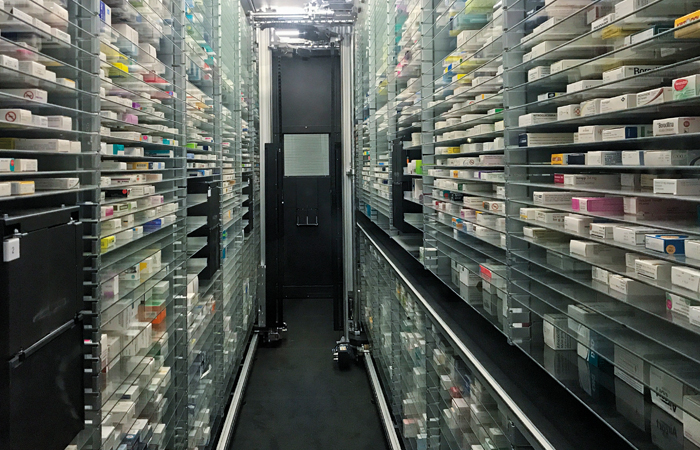In In-depth
Follow this topic
Bookmark
Record learning outcomes
A recent survey by magazine and newspaper app Readly showed that Brits are most positive about the use of artificial intelligence (AI) in the medical sector above all others. While two-thirds (62 per cent) of respondents were either worried or had mixed feelings about AI, and only one in five (19 per cent) were optimistic about its benefits generally, 44 per cent agreed it is of use in medicine and medical technology.
As ageing populations and the incidence of long-term conditions rise, AI is set to play an increasingly vital role in health and care settings through its ability to analyse large quantities of complex information and use these to make predictions, solve problems and even learn from its own mistakes.
NHS investment
The UK Government has already invested £123m into 86 AI technologies which are helping patients by supporting stroke diagnosis, screening, cardiovascular monitoring and managing conditions at home. In June the Department of Health and Social Care (DHSC) announced a further £21m AI Diagnostic Fund to accelerate the deployment of AI imaging and decision support tools to help faster diagnosis of conditions such as cancers, strokes and heart conditions. The DHSC has said it is also “committed” to rolling out AI stroke-diagnosis technology to all stroke networks by the end of 2023.
AI has even been called in to help prevent avoidable admissions this winter, as part of a range of tech solutions being rolled out across the NHS.
- Four GP practices in Somerset are trialling an AI system which can highlight registered patients with complex health needs, at risk of hospital admission or who rarely contact their GP, and reach out to them for conversations about their health. People most at risk will then be contacted by health coaches, nurses, or GPs who can provide a range of preventive care such as offering vulnerable patients food parcels, escalating care to specialist doctors, putting in support to avoid falls, or link them up with a local voluntary group to help avoid loneliness
- In Buckinghamshire, the NHS is using AI linked to electronic sensors on kettles and fridges that spot changes in patients’ eating and drinking habits. These are then flagged with a non-clinical Onward Care team who speak to patients, solving 95 per cent of their issues or escalating anything clinical. Patients can choose local, practical measures which are helping frail patients avoid hospital readmission by offering monitoring, as well as a range of other help such as cleaning, shopping, and food parcels
- NHS teams in some areas of Birmingham are piloting an approach which uses an algorithm to predict the top five per cent at risk of potential hospital attendances or admissions. Staff check in to offer social care assessments, medication reviews or other social prescribing measures to avoid A&E admissions, with the aim of preventing 4,500 unnecessary A&E attendances, 17,000 overnight hospital stays, and freeing up 23,000 GP appointments over the next two years.
Clinician support
It’s not just patients who benefit. AI can also support healthcare professionals to make the best use of their expertise and help save them time.
“AI can help healthcare providers make more informed decisions by providing them with relevant data, insights and recommendations,” says Peter Shone, chief technology officer of online medicines sourcing tool iethico. “As well as helping monitor patients remotely, alert healthcare providers to potential issues, and improve patient outcomes, AI can help automate administrative tasks such as scheduling appointments, managing electronic health records, and processing insurance claims, which can help reduce costs, improve efficiency, and free up healthcare providers to focus on patient care.”
Indeed, recent research has shown that AI is almost twice as good at grading the aggressiveness of retroperitoneal sarcoma – a rare form of cancer which develops in the connective tissue of the back of the abdomen – from scans, by recognising details invisible to the naked eye. According to researchers from the Royal Marsden Hospital and Institute of Cancer Research, AI was 82 per cent accurate, compared with 44 per cent for lab analysis.
Benefits and risks of AI in healthcare
By far the biggest benefit in all healthcare applications is the speed and responsiveness of AI.
“The closest example will be an extremely fast-moving octopus with eight million legs,” says pharmacist and AI specialist, Salman Chishti. “In a recent exercise, it took AI just a few seconds to compare my two ECGs and then compare the difference with a live-cardio-monitor [and] I also had a full report as a patient and as a healthcare professional.”
However, while AI has the power to deliver significant benefits to health and care, and the wider economy, there are significant ethical and safety concerns associated with its use.
“The cons at this stage in healthcare is AI cannot behave like an expert clinician,” says Salman, “and it’s also not possible for the technology producers to take all the legal responsibility of human life and care.”
Certainly, if we do not consider transparency, accountability, liability, explicability, fairness, justice and bias, it is possible that increasing the use of data-driven technologies, including AI, within the health and care system could cause unintended harm.
Predictions for the future
Salman says the development of AI in healthcare “will continue faster than we can now think”. He adds: “Most certainly we can reduce the four to five years of university training for healthcare professionals given the huge labour shortage worldwide.”
Tariq Muhammad, CEO of Invatech Health – whose TITAN PMR is the first system to use AI for the clinical checking of prescriptions received in community pharmacy – says harnessing all the data from healthcare apps, the summary care record, and pharmacy systems would enable the pharmacy team to track illnesses and predict far more accurately when patients need an intervention.
“Until now, we still use very blunt methods to support patients,” he says. “For example, if you are over 40 we recommend you get a blood pressure check, we know smoking is bad and drinking too much is not good. But these points are still very primitive and do not take into account all of the individual’s lifestyle and predispositions.
“In the future we will be able to capture patient data from multiple sources and use AI to offer targeted care which is personalised to the individual. The potential to use AI to transform the way we deliver healthcare is huge, and arguably, the ONLY way we are going to meet the health needs of future generations.”
Gary Coffey, chief technology officer at Spectrum.Life – provider of employer health and wellness services in the UK and Ireland – says looking ahead to 2024, health technology is poised for “groundbreaking advancements” not least because of the potential
of AI.
“We have seen with AI symptom checkers, which are already integrated with some major global insurers, that there is a place for clinically driven AI,” he says.
“The crucial question for health tech plans in 2024 revolves around how seamlessly AI can be integrated into the user journey and to what extent this interaction will be automated.”
While we are undoubtedly seeing great applications of AI in healthcare, more work is needed to fully harness its benefits and use it safely and ethically at scale.
“The UK government has already invested £123 million into 86 AI technologies”
AI tools in community pharmacy
Artificial Intelligence has already established a foothold in some community pharmacy applications, demonstrating efficiencies for pharmacy staff and patients alike.
Invatech Health’s TITAN PMR uses AI for the clinical checking of prescriptions received in community pharmacy. “Typically, pharmacists spend a lot of time looking at prescriptions, checking doses and ensuring the drug is safe to supply based on the information available to them,” explains Invatech CEO Tariq Muhammad. “A lot of this work is monotonous and most of the time they are correcting the dosage with only a small fraction of prescriptions that require a serious intervention.
“By gathering the data of what pharmacists do every time they see a prescription, we can ‘learn’ the common behaviour and then use this data to predict future decisions. This is known as machine learning and is how TITAN’s AI system, called TITAN X, works. The system has been adopted in over half of all Titan sites and over 20 million prescriptions have been processed through TITAN X since its launch. On average, TITAN X is saving around 80 per cent of pharmacists’ time from dispensing activities and, by automating the mundane work, pharmacists are now more efficient in preventing serious errors and are freed up to provide more important clinical services, without compromising safety of supply.”
Pharmacy dispensing robots are another example of AI reducing workload and accelerating the pharmacy processes. Already common in many hospitals, these robots automate tasks such as dispensing medication and managing stock levels.
However, while robotic systems driven by AI can radically change the workflow of a hospital pharmacy, Peter Shone – CTO of online medicines sourcing tool iethico – says it will require “significant investment” if adoption is to spread to community pharmacies.
There is, of course, a possible downside to the introduction of AI into community pharmacies, as pharmacist and AI specialist Salman Chishti points out. “AI is not coming in or after community pharmacy,” he says.
“However, Boots or Superdrug are particularly vulnerable to AI’s advancement in beauty and consumer goods [since] AI based B2C platforms will erode retail earnings from community pharmacy.” He also fears that “AI will help the Government to reduce the overall funding pot for pharmacy further”.
He adds: “Even before and without AI, current self monitoring tools can start transferring data to GPs, completely bypassing the need for community pharmacies to provide ‘expensive’ BP checks on behalf of the tax payer.”

Pharmacy dispensing robots can help to accelerate pharmacy processes.

